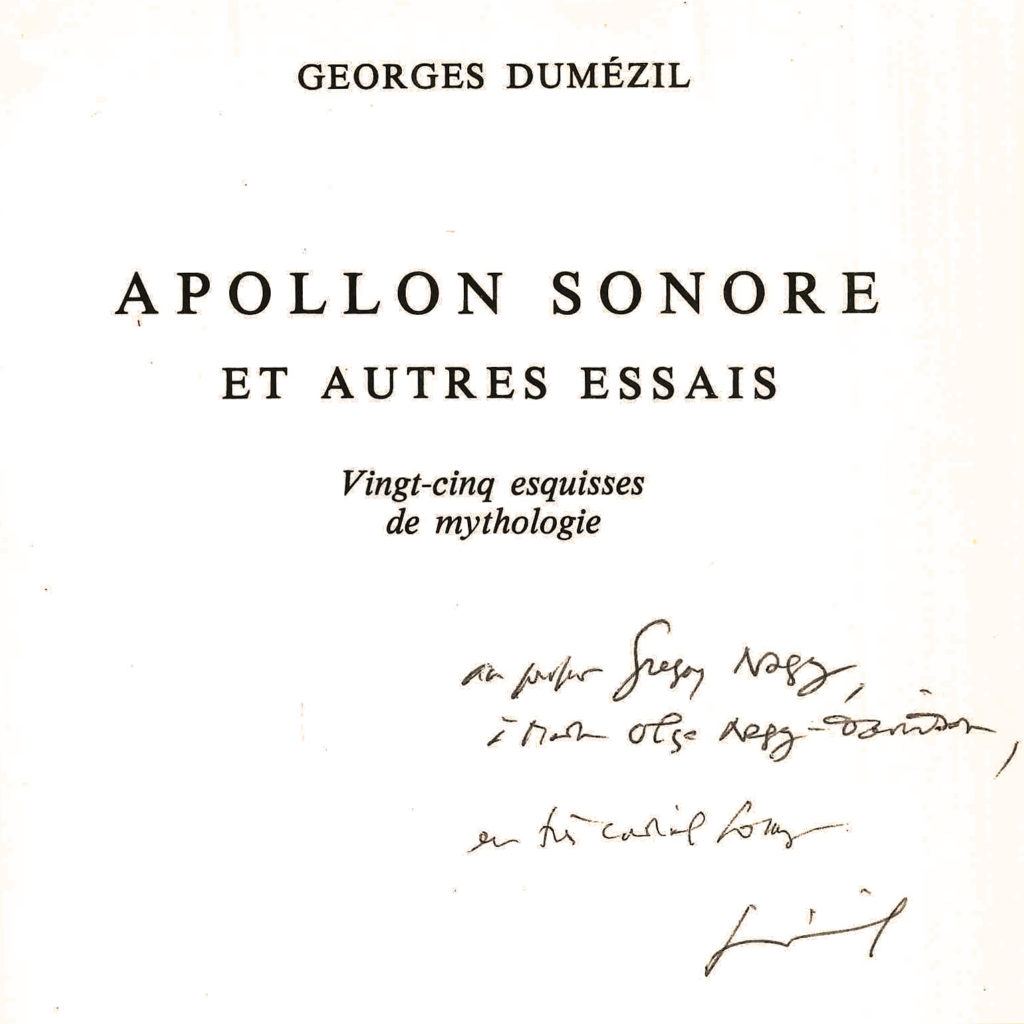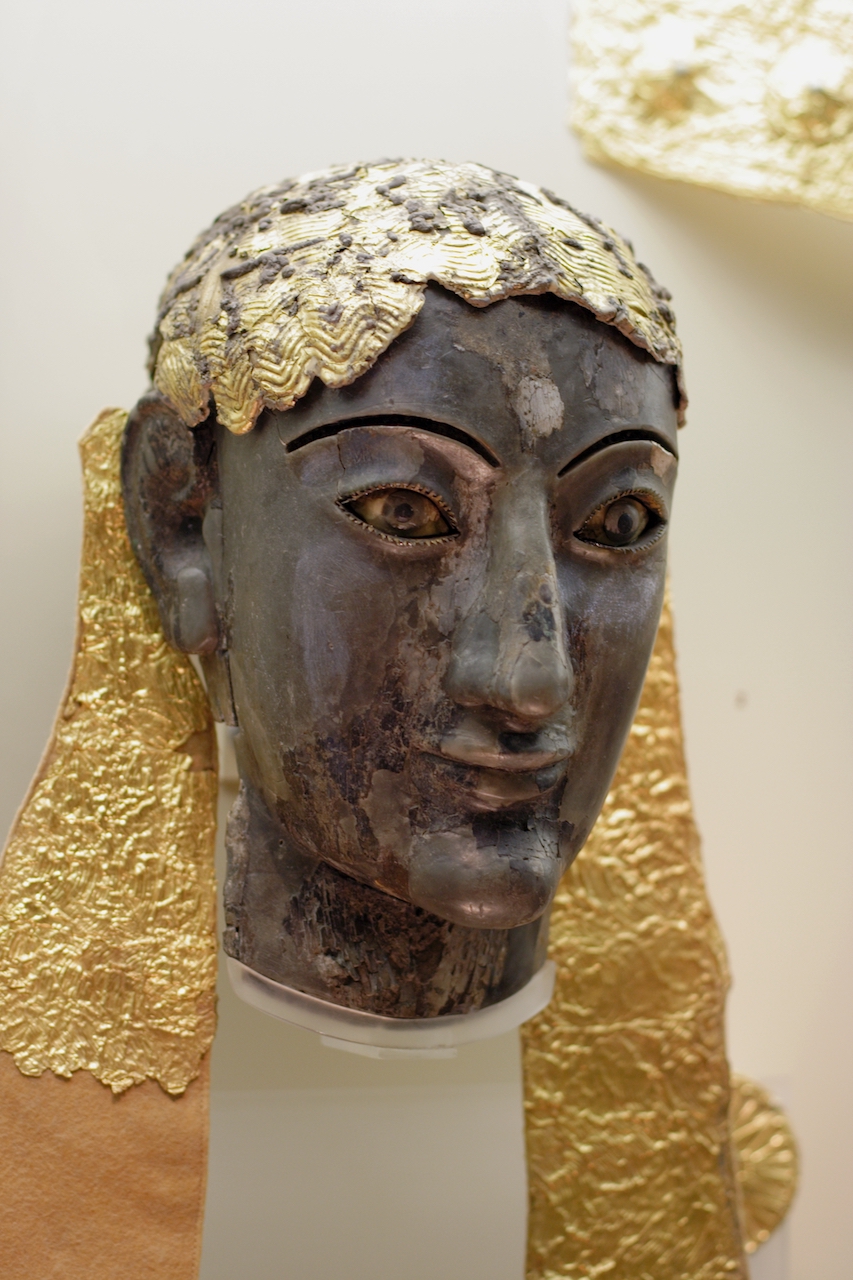2020.02.14, rewritten 2022.02.14 | By Gregory Nagy

§0. This essay, posted in Classical Continuum and dated for Valentine’s Day 2022.02.14, is a rewriting of an essay posted in Classical Inquiries exactly two years earlier, for Valentine’s Day 2020.02.14. That earlier date marked the fifth anniversary of my starting a consecutive series of weekly essays submitted to Classical Inquiries. At the time, I thought of my essay as the first of a new set of intermittent “sketches” about comparative mythology, modeled on the Esquisses de mythologie of Georges Dumézil; there had been, in all, one hundred such mythological sketches by Dumézil himself, published in four volumes, each containing twenty-five Esquisses, in 1982, 1983, 1985, and, finally, in 1994—almost a decade after his death in 1986. I have fond memories of receiving a parcel, back in 1982, containing a copy of the first of these four volumes, Apollon sonore, inscribed by Dumézil with greetings not only to me but also to Olga/Holly, that is, to “madame Olga Nagy-Davidson”—as he used to call her in his inimitably courtly style. At the time when I wrote my own initial essay, two years ago, I was just looking through Holly’s shelves and found that old book, a treasured present from a mentor who had given so much support and encouragement to her in Paris when she was starting off on her own projects in comparative mythology. With Holly’s permission I shared then and share again now for the main illustration in this posting here a photocopy of the front page of our weathered copy of Apollon sonore, where Dumézil had penned his inscription. In a tribute to Holly’s own comparative studies, written by me on a previous Valentine’s Day, in Classical Inquiries 2018.02.14, I reminisced at 1§§13–14 about even earlier happy times, in 1974, when Holly and I, before we really even knew each other all that well, were already reading together the original 1968 version of Dumézil’s Mythe et épopée I. As I wrote in those reminiscences, “you can begin to see how the academic as well as personal lives of OMD and GN were converging rapidly—and how the thinking of Dumézil can even be viewed here as some kind of dart sent by Cupid himself.” Maybe I exaggerate, but the sentiments were there, and they seem to me most apt for restatement even now, on the occasion of yet another Valentine’s Day.
§1. In a new printing, 1986, of Myth et épopée I, which had originally been published in 1968, Georges Dumézil added some notes at the end, which can now be found at pp. 668–672 of the new posthumous single-volume edition of all three old volumes of Myth et épopée I/II/III, 1968/1971/1973. This new edition is listed as “Dumézil [1995]” in my Bibliography. Those notes of Dumézil, written in 1986, shortly before he died on October 11 in that same year, contain a summary of what he considered to be the essence of his arguments concerning the evidence of Greek mythology as a point of comparison for his overall reconstructions of Indo-European mythology. At p. 671 of his summary in “Dumézil [1995],” he begins with a reference to what he argued in the first eight Esquisses of his book Apollon sonore, 1982. His arguments there centered on the god Apollo, and about this god’s dominant role in the Homeric Iliad and in the Homeric Hymn to Apollo. The question was, how does Apollo fit or not fit an Indo-European model of “myth and epic” as reconstructed in Dumézil’s three-volume work, Mythe et épopée? In launching a set of my own essays on comparative mythology in Classical Inquiries, two years ago, and now in re-launching a rewritten set of those essays here in Classical Continuum, I too will start with that same question about the god Apollo.

§2. Though my own views about Apollo diverge in some ways from the views of Dumézil, I concentrate here in this essay on convergences. I highlight, on the basis of my overall reading of Esquisses 1 through 8, pp. 13–85, the general observations made in Apollon sonore concerning the comparative evidence of “myth and epic” as reflected in Homeric poetry, both in the Homeric Hymn to Apollo and in the Homeric Iliad and Odyssey. The voice of Apollo, in pronouncing his oracular words, is described in ways that resemble the authoritative voices of divinities in the poetry of the Indic Vedas and in other cognate forms of verbal art.
§3. With reference to my own work on Apollo, especially in The Best of the Achaeans (Nagy 1979) as cited by Dumézil in Apollon sonore at p. 85, I now also highlight a specific point of convergence in Apollon sonore, at p. 82, where the antagonism of the god Apollo with Achilles, the primary hero of the Iliad, is viewed in terms of their relationships with the supreme god of the cosmos, Zeus himself. As I will elaborate in postings to come, I see in this antagonism a parallelism between Apollo as a son of Zeus who will never replace his father as cosmic ruler and, on the other hand, Achilles as “a true son that Zeus never had.” As I have already argued in Best of the Achaeans 20§28, especially with reference to an old myth made explicit in Pindar’s Isthmian 8, Achilles could have overthrown Zeus himself if only his mother, the cosmic goddess Thetis, had been impregnated by the god and not by the hero’s mortal father, Peleus.
§4. From the viewpoint of Dumézil, such a parallelism indicates a non-Indo-European genealogy for both Apollo and Achilles. My analysis, however, as we will see in postings to come, points to a different explanation: I do see an underlying Indo-European pattern in this and in other such Homeric examples of “myth and epic.”
§5. Differences aside, though, I find myself fully engaged with the exactitude of Dumézil in his readings of Homeric poetry, especially of the Iliad. He shows time and again that he has read the epic most carefully, following the example of a great French poet to whom he alludes in this way at p. 73 of Apollon sonore:
Conseil: en trois jours ou en vingt-quatre, chaque année, relire l’Iliade pour le plaisir, sans lui poser de questions.
Here is my free translation:
A word of advice: whether it takes you three days or twenty-four, you should re-read, every year, the Iliad—just for the sheer pleasure of it all—and don’t go on asking it to give you answers.
The French poet whom Dumézil obviously has in mind is Pierre de Ronsard (1524–1585):
Je veus lire en trois jours l’Iliade d’Homere,
Et pour-ce, Corydon, ferme bien l’huis sur moy.
Si rien me vient troubler, je t’asseure ma foy
Tu sentiras combien pesante est ma colere.
Je ne veus seulement que nostre chambriere
Vienne faire mon lit, ton compagnon, ny toy,
Je veus trois jours entiers demeurer à requoy,
Pour follastrer apres une sepmaine entiere.
Mais si quelqu’un venoit de la part de Cassandre,
Ouvre lui tost la porte, et ne le fais attendre,
Soudain entre en ma chambre, et me vien accoustrer.
Je veus tant seulement à luy seul me monstrer :
Au reste, si un Dieu vouloit pour moy descendre
Du ciel, ferme la porte, et ne le laisse entrer.
—
“lu par Sappho”…
—
Here is my attempt at a translation:
I want to read in three days the Iliad of Homer
and so, Corydon, I want you to shut that door on me, shut it really tight.
There had better be nothing that comes and troubles me, or else, I swear,
You will feel just how heavy it is, the weight that comes down on you, that weight of my rage.
I don’t just want her, I mean, that chambermaid of ours, not to
come and make my bed, that companion of yours, and you neither,
I just want three days, three full days, where I just stay in peace and quiet,
and then I can fool around after that for a whole week even.
But if someone comes with a message from her, from Cassandre,
then open up for him right away the door, don’t make him wait,
and, quick quick, come into my chamber and get me all dressed up.
I so want this and only this, to show myself to that one, and to no one else.
Otherwise, why, even if a god should want to come down to me
from the heavens above, just close the door on him. Don’t let him come in.
Bibliography
Dumézil, G. 1968, reprinted 1986. Mythe et épopée I. L’idéologie des trois fonctions dans les épopées des peuples indo-européennes. Paris.
Dumézil, G. 1971, 2nd edition 1986. Mythe et épopée II. Types épiques indo-européens: un héros, un sorcier, un roi. Paris.
Dumézil, G. 1973, 2nd edition 1978, 3rd edition 1981. Mythe et épopée III. Histoires romaines. Paris.
Dumézil, G. 1975. Fêtes romaines d’été et d’automne, suivi de dix questions romaines. Paris.
Dumézil, G. 1980. Camillus: A Study of Indo-European Religion as Roman History. Translated by A. Aranowicz and J. Bryson. Edited and with introduction by U. Strutynski. Berkeley and Los Angeles. = Part 2 of Mythe et épopée III = Dumézil 1973, plus Appendices 1 and 2 of Dumézil 1973, plus Appendices 3 and 4 of Dumézil 1975.
Dumézil, G. 1982. Apollon sonore et autres essais. Vingt-cinq esquisses de mythologie. Paris.
Dumézil, G. 1983. La Courtisane et les seigneurs colorés et autres essais. Vingt-cinq esquisses de mythologie (26–50). Paris.
Dumézil, G. 1983b. The Stakes of the Warrior. Translated by D. Weeks. Edited, with an Introduction, by J. Puhvel. Berkeley and Los Angeles. = Part 1 of Mythe et épopée II = Dumézil 1971.
Dumézil, G. 1985. L’oubli de l’homme et l’honneur des dieux, et autres essais. Vingt-cinq esquisses de mythologie (51–75). Paris.
Dumézil, G. 1986. The Plight of the Sorcerer. Translated by D. Weeks and others. Edited by J. Puhvel and D. Weeks. Introduction by D. Weeks. Berkeley and Los Angeles. = Part 2 of Mythe et épopée II = Dumézil 1971.
Dumézil, G. 1994. Le roman des jumeaux et autres essais. Vingt-cinq esquisses de mythologie (76–100). Edited by J. H. Grisward, with preface at pp. 9–15. Paris.
Dumézil, G. [1995.] Mythe et épopée I, II, III. New combined and corrected edition of the original three volumes, with original paginations retained in the inner margins. Preface by J. H. Grisward, pp. 7–30. Paris.
Nagy, G. 1979/1999. The Best of the Achaeans: Concepts of the Hero in Archaic Greek Poetry. Baltimore. Revised ed. with new introduction 1999. http://nrs.harvard.edu/urn-3:hul.ebook:CHS_Nagy.Best_of_the_Achaeans.1999.
Nagy, G. 1981. “Essai sur Georges Dumézil et l’étude de l’épopée grecque.” In Cahiers “Pour un temps”: Georges Dumézil, ed. J. Bonnet et al., 137–145. Aix-en-Provence. Rewritten as part of Chapter 1 in Nagy 1990b.
Nagy, G. 1990. Greek Mythology and Poetics. Ithaca, NY. Revised paperback edition 1992. http://nrs.harvard.edu/urn-3:hul.ebook:CHS_Nagy.Greek_Mythology_and_Poetics.1990.